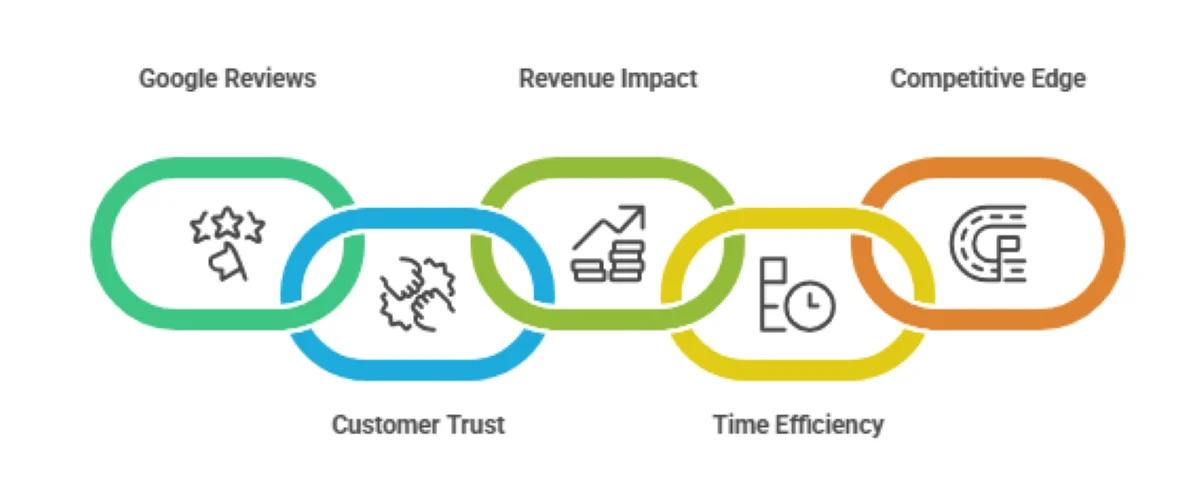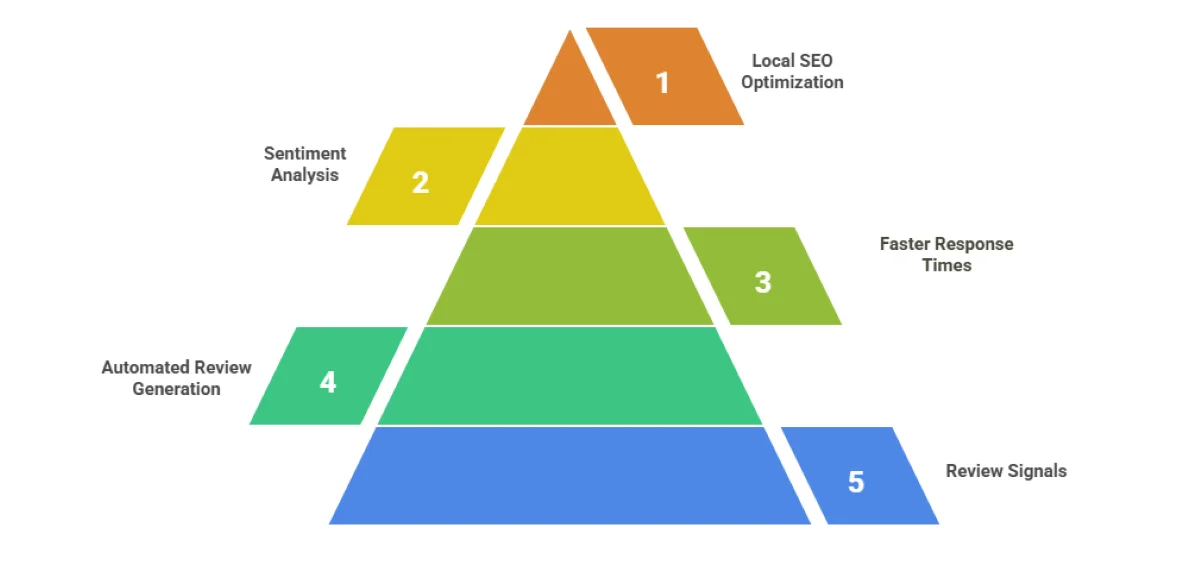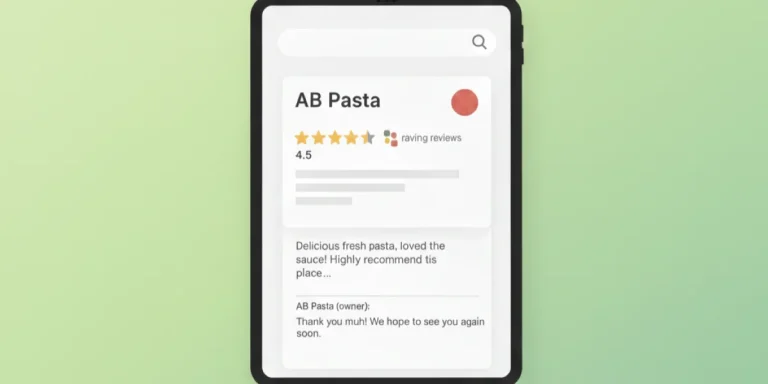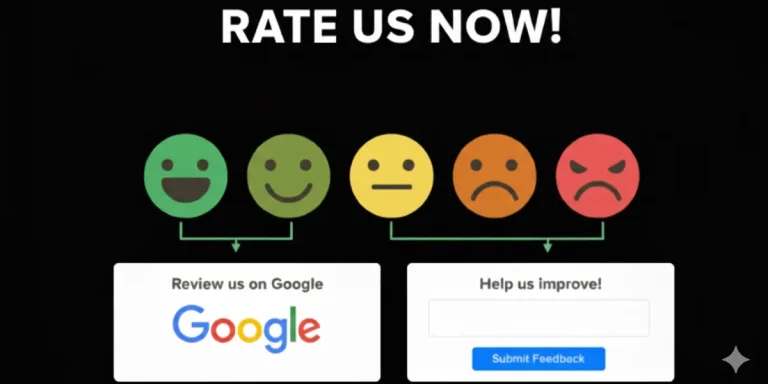
Every small business owner knows the feeling of discovering an unexpected negative review online. That moment when you realize someone had a poor experience and shared it publicly before you could make things right. Managing business reputation once meant hours spent manually monitoring review sites and crafting individual responses. Fortunately, the best AI-powered reputation management software for small businesses in 2025 now automates these tasks, helping business owners respond faster, maintain trust, and stay focused on growth.
According to the Local Consumer Review Survey, 83% of consumers use Google to read reviews, with significant changes in how consumers interact with online feedback. Modern AI-powered platforms automate review requests, analyze customer sentiment instantly, and generate responses within minutes rather than hours.
These intelligent systems help small businesses maintain a positive online presence while dramatically reducing time investment and strengthening customer relationships across all digital touchpoints.
What is AI-Powered Reputation Management Software?
AI-driven reputation management software uses artificial intelligence to automate and optimize how businesses monitor, collect, and respond to customer reviews and feedback. These platforms leverage machine learning algorithms to analyze customer sentiment, generate personalized review requests, and craft appropriate responses to reviews across multiple platforms like Google, Yelp, and Facebook.
The key difference between traditional and AI-based reputation management lies in automation and intelligence. Traditional tools require manual monitoring and response writing, while AI systems can automatically detect review patterns, send targeted review requests to satisfied customers, and suggest or generate responses that match your brand voice. This technology helps small businesses maintain a consistent online presence without dedicating hours each week to reputation management tasks.
Why is reputation management crucial for small businesses?

Small businesses face unique challenges when building and maintaining their online reputation, making professional reputation management tools essential for growth and sustainability.
Google reviews influence local SEO rankings.
Google considers review signals as one of the top ranking factors for local search results, with businesses having more positive reviews appearing higher in map packs and local searches. Research shows that businesses with positive Google reviews can experience up to an 18% boost in revenue from Google search results.
Customer trust and purchase decisions
According to recent studies, 85% of consumers trust online reviews as much as personal recommendations. However, data shows a significant shift: only 42% of consumers now trust reviews as much as personal recommendations, down from 79% in 2020, indicating consumers are becoming more discerning about online feedback.
Revenue impact of review management
Harvard Business School research confirms that a one-star increase in Yelp rating leads to a 5-9% increase in revenue. Additionally, businesses with higher review ratings can see substantial revenue improvements compared to competitors with lower ratings.
Time constraints for manual monitoring
Small business owners typically spend 12+ hours weekly monitoring review platforms and crafting responses, time that could be better spent on core business operations and customer service.
Competitive advantage through consistency
Consistent review management helps small businesses compete with larger companies by demonstrating reliability, responsiveness, and commitment to customer satisfaction across all online touchpoints.
Top features of AI-powered reputation management software
Modern AI reputation management platforms offer sophisticated features designed specifically to help small businesses automate and improve their online presence management.
Automated review requests via multiple channels
AI systems automatically send personalized review requests through SMS, email, and WhatsApp based on customer interaction triggers, increasing positive review volume without manual intervention or staff time.
AI-driven sentiment analysis and response generation
Advanced natural language processing analyzes review content to determine customer emotions and satisfaction levels, then generates appropriate responses that maintain consistent brand voice and tone.
Multi-platform review tracking and monitoring
These platforms monitor reviews across Google My Business, Yelp, Facebook, industry-specific sites, and social media, providing centralized dashboards for comprehensive reputation oversight and management.
Real-time monitoring dashboards and alert systems
Instant notifications alert business owners to new reviews, rating changes, or potential reputation issues, enabling quick responses that demonstrate customer service commitment and prevent escalation.
Integration with existing CRM and POS systems
AI reputation tools connect with customer relationship management and point-of-sale systems to automatically trigger review requests after purchases or positive interactions, streamlining the entire process.
Best AI-powered reputation management tools for small businesses in 2025

The market offers several excellent AI-powered reputation management platforms, each with unique strengths for different types of small businesses and budgets.
NiceJob for affordable AI review automation
NiceJob transforms service-based businesses through automated review generation and social media content creation, making reputation management accessible for small teams with limited resources.
Key Features:
- AI-Powered Response Generation: The platform includes AI-generated review responses and automated follow-ups, saving business owners considerable time while maintaining professional customer engagement across multiple platforms
- Social Media Content Creation: NiceJob automatically creates and shares customer stories across social platforms using reviews, photos, and testimonials to boost online presence without manual content creation
- CRM Integration Capabilities: The software integrates with popular business systems like QuickBooks, HubSpot, Jobber, and field service management tools to trigger automated review campaigns
Spreadical for WhatsApp-focused AI automation
Spreadical specializes in Google review management through WhatsApp integration, offering AI-powered review monitoring and response automation for businesses preferring mobile-first communication approaches.
Key Features:
- AI-Powered Response Generation: The platform creates personalized, on-brand replies using AI that learns from business feedback over time, generating contextually appropriate responses for different review sentiments
- Automated Review Collection: Spreadical sends personalized review invitations via WhatsApp, achieving higher response rates than traditional email campaigns due to WhatsApp’s superior engagement and read rates
- Real-Time Monitoring System: The platform automatically fetches every new Google review in real-time and sends instant WhatsApp alerts with suggested replies, enabling businesses to respond within minutes
- Cloud-Based Review Storage: All Google reviews and responses are securely stored in searchable cloud storage, providing businesses with complete review history and response tracking capabilities
Birdeye for comprehensive AI-powered review and local SEO
Birdeye delivers comprehensive AI-driven reputation management tools features designed for multi-location businesses seeking integrated marketing and customer experience solutions.
Key Features:
- BirdAI Response Automation: Birdeye’s proprietary AI architecture generates automated responses to reviews while maintaining brand voice consistency across all customer interactions and business locations
- Multi-Platform Review Monitoring: The platform aggregates reviews from over 150 platforms, including Google, Yelp, Facebook, and industry-specific sites, providing centralized reputation tracking with real-time notifications
- Local SEO Optimization Tools: Birdeye’s Listings AI creates accurate business profiles and manages directory information across multiple platforms to improve local search visibility and rankings
- Advanced Sentiment Analysis: The platform uses AI-powered insights to analyze customer feedback trends, benchmark performance against competitors, and identify specific reputation improvement opportunities
Podium for AI-driven messaging and review requests
Podium specializes in text-based customer communication with AI automation, helping service businesses convert leads and collect reviews through preferred messaging channels.
Key Features:
- Text Message Review Requests: The platform sends review invitations via SMS, achieving higher response rates than email campaigns due to the high open rate of text messages
- Centralized Communication Inbox: Podium consolidates messages from SMS, Facebook, Google Business Profile, Instagram, and other channels into one unified inbox for efficient team management
- Payment Collection Integration: Businesses can collect payments through text messages with secure payment links, supporting Apple Pay, Google Pay, and traditional payment methods for streamlined transactions
- Video Chat Capabilities: The platform offers seamless transition from text to video communication, enabling face-to-face troubleshooting, product demonstrations, and personalized customer service
Reputation.com for advanced analytics and AI sentiment tracking
Reputation.com provides enterprise-level AI analytics and predictive sentiment analysis, helping organizations understand customer feedback patterns and implement data-driven reputation improvements.
Key Features:
- Patented AI Technology: Reputation’s platform processes billions of pieces of feedback across 70+ industries using proprietary AI and machine learning algorithms developed over more than a decade
- Advanced Sentiment Classification: The system uses natural language processing to automatically extract emotional insights from customer comments, categorizing sentiment with industry-specific accuracy and context understanding
- Real-Time Feedback Analysis: AI-powered dashboards provide immediate insights into campaign performance and customer satisfaction levels, enabling rapid response to emerging reputation issues
- Industry-Specific Algorithms: The platform employs specialized sentiment analysis models tailored to different business sectors, ensuring accurate interpretation of feedback across healthcare, automotive, retail, and other industries
How AI tools improve Google reviews and local SEO

AI reputation management software directly impacts local search performance by improving review quality, quantity, and response rates, which Google considers when ranking local businesses.
Review signals affect local search rankings significantly
Recent industry research indicates that review signals remain an important ranking factor for local search results, with review quantity, quality, and recency all contributing to higher visibility.
Automated review generation increases positive feedback volume
AI systems can systematically increase positive review volume by automatically identifying satisfied customers and sending timely, personalized review requests through preferred communication channels.
Faster response times improve customer perception.
AI-powered response systems enable businesses to reply to reviews within hours instead of days, demonstrating responsiveness that both customers and search engines value for local credibility.
Sentiment analysis prevents reputation crises
AI monitoring detects negative sentiment patterns before they become major issues, allowing businesses to address problems proactively and maintain consistently positive online reputations.
Local SEO optimization through review management
Consistent review management improves overall local SEO performance by maintaining fresh content, encouraging customer engagement, and building trust signals that Google uses for ranking decisions.
Cost of AI reputation management software for SMBs
Understanding the investment required for AI reputation management helps small businesses make informed decisions about which platforms offer the best value for their specific needs and budgets.
Pricing tiers range from $75 to $899+ monthly.
Most AI-driven reputation management tools offer tiered pricing starting around $75 per month for basic features, scaling up to $899+ for advanced analytics and multi-location management. Enterprise solutions can exceed $2,000 monthly for comprehensive features.
ROI through improved customer acquisition metrics
Businesses typically see measurable improvements in customer acquisition within six months of implementing AI reputation management. The combination of increased review volume, faster response times, and improved ratings often results in enhanced conversion rates that justify the software investment.
Cost savings from automation efficiency
Automated review management saves 10-15 hours weekly compared to manual processes, representing significant labor cost savings that often exceed monthly software subscription fees for small businesses.
Value comparison with traditional marketing spend
AI reputation management often delivers better ROI than traditional advertising, with positive reviews providing ongoing marketing value that compounds over time rather than requiring continuous spending.
Budget considerations for different business sizes
Solo practitioners can start with basic plans around $75-125 monthly, while multi-location businesses should budget $400-899 monthly for platforms that handle multiple locations and advanced features.
How to choose the best AI reputation management tool for your business?
Selecting the right AI reputation management platform requires evaluating your specific business needs, budget constraints, and growth plans to ensure long-term success and value.
Budget allocation and feature requirements assessment
Determine monthly budget limits and prioritize essential features like review automation, multi-platform monitoring, or local SEO tools based on your business model and customer interaction patterns.
Integration capabilities with existing business systems
Evaluate how well potential platforms integrate with your current CRM, POS, scheduling, or marketing systems to ensure smooth data flow and automated workflow processes.
Number of locations and review volume considerations
Single-location businesses need different features than multi-location operations, with scalability, location-specific reporting, and centralized management becoming crucial for businesses with multiple sites.
Trial periods and demo testing recommendations
Most reputable platforms offer 14-30-day free trials or live demos, allowing you to test AI features, user interface, and customer support quality before committing to annual contracts.
Customer support and training resource availability
Consider platforms offering comprehensive onboarding, training materials, and responsive customer support, especially if your team lacks technical expertise with AI-powered business tools.
Future trends in AI reputation management
The reputation management industry continues evolving with new AI technologies that will reshape how small businesses monitor, analyze, and respond to customer feedback in the coming years.
Predictive review analysis and customer behavior modeling
Advanced AI will predict which customers are likely to leave negative reviews based on interaction patterns, enabling proactive customer service interventions before problems escalate publicly.
AI auto-responders with natural language processing improvements
Next-generation AI responses will become more sophisticated and contextually appropriate, using advanced language models for more nuanced customer interactions. BrightLocal’s 2024 research found that 58% of consumers preferred AI-written review responses when compared to human-written ones, though they didn’t know which was which.
Voice and video review analytics capabilities
AI platforms will expand beyond text analysis to process voice messages, video testimonials, and audio feedback, providing deeper insights into customer emotions and satisfaction levels.
Integration with emerging social commerce platforms
As social media platforms add more commerce features, AI reputation management will expand to monitor and manage reviews across TikTok Shop, Instagram Shopping, and other emerging channels. Current data shows that 20% of consumers already use TikTok for local business discovery.
Real-time customer sentiment prediction and intervention
AI systems will monitor customer behavior across multiple touchpoints to predict satisfaction levels and automatically trigger retention campaigns or service recovery processes before negative reviews occur.
Challenges and limitations of AI reputation management
While AI-driven reputation management tools offers significant benefits, businesses should be aware of potential challenges and limitations when implementing these solutions.
AI accuracy and context understanding
AI systems may occasionally misinterpret complex customer emotions or cultural nuances in reviews, requiring human oversight for sensitive situations or complex feedback.
Platform dependency and integration issues
Heavy reliance on AI platforms can create dependencies, and integration challenges may arise when connecting with existing business systems or when platforms update their features.
Cost considerations for small businesses
While AI tools offer time savings, the monthly subscription costs can be significant for very small businesses, requiring careful ROI analysis to justify the investment.
Consumer skepticism about AI responses
As consumers become more aware of AI-generated content, there may be growing expectations for authentic, human responses to personal feedback, particularly for negative reviews.
Final words
AI-powered reputation management software has become essential for small businesses competing in today’s digital marketplace. These platforms automate time-consuming review management tasks while improving customer relationships and local search visibility.
Spreadical represents a new approach to reputation management, offering businesses the ability to manage their entire Google review process directly through WhatsApp. This mobile-first solution transforms how customers perceive your brand by enabling instant responses to reviews and seamless review collection, directly impacting revenue through better reviews and higher search rankings.
Frequently asked questions
What is AI-powered reputation management software?
AI-powered reputation management software uses artificial intelligence to automate review collection, analyze customer sentiment, and generate responses to feedback across multiple platforms. These tools help businesses maintain positive online reputations without manual monitoring and response writing.
How does AI improve review management for small businesses?
AI improves review management by automatically sending review requests to satisfied customers, analyzing sentiment in existing reviews, and generating appropriate responses faster than manual processes. This automation helps small businesses maintain a consistent online presence while saving significant time.
What are the best AI tools for reputation management in 2025?
The top AI reputation management tools include NiceJob for affordable automation, Birdeye for comprehensive features, Podium for messaging-focused capabilities, Reputation.com for advanced analytics, and Spreadical for WhatsApp-native review management. Each platform offers different strengths for various business types.
Can AI reputation software help increase Google reviews?
Yes, AI reputation software can systematically increase Google reviews by automatically identifying satisfied customers and sending personalized review requests through preferred communication channels. Most businesses see measurable increases in positive review volume within months of implementation.
How much does AI reputation management software cost for SMBs?
Entry-level plans typically start around $131 monthly, not $75-125. Mid-tier systems commonly cost $248, while enterprise plans range from $400+.
Does AI-driven review management improve local SEO rankings?
AI-driven review management improves local SEO by increasing positive review volume, enabling faster response times, and maintaining a consistent online presence across platforms. Reviews remain an important factor in local search ranking algorithms, with businesses seeing improved visibility through consistent review management.
Which industries benefit most from AI-powered reputation management?
Service-based industries like healthcare, restaurants, retail, automotive, and professional services benefit most from AI reputation management due to high customer interaction volumes and review dependency. However, any business serving customers can benefit significantly from automated reputation management.
Can small businesses use AI review tools without technical expertise?
Yes, most AI reputation management platforms are designed for non-technical users with intuitive interfaces, automated setup processes, and comprehensive customer support. Many platforms offer onboarding assistance and training resources for small business owners.
What AI features should SMBs look for in reputation software?
Small businesses should prioritize automated review requests, multi-platform monitoring, sentiment analysis, response suggestions, integration capabilities, and real-time alerts. Advanced features like predictive analytics may be valuable for growing businesses with higher review volumes.
Is AI reputation management suitable for multi-location businesses?
AI reputation management is particularly valuable for multi-location businesses because it centralizes review monitoring, automates location-specific review requests, and provides consolidated reporting across all sites. Many platforms offer location-specific features and management tools designed for multi-location operations.


